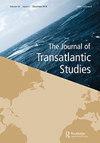跨大西洋研究和西班牙语的地缘政治
Q1 Arts and Humanities
引用次数: 0
摘要
跨大西洋研究是双重转变的结果:由区域研究的地缘政治去银行化引发的地理位移,以及由生物资本主义积累制度产生的认识论裂痕。这种综合转变转化了构成我们全球时代的深刻的地缘政治重组、经济转型和认识论困境。如果从大陆地区到海洋范围的地理位移是为了挽救区域研究,使其免于地缘政治的过时,那么从核心的,新实证主义和发展主义的社会科学到相对主义,后现代和后殖民的多元文化主义的认识论位移是对经济驱动和全球经验的文化转向的回应,拉美裔跨大西洋研究的出现可以被理解为美国拉美裔试图通过参与这场全球地缘政治重组来恢复其失去的威望和历史霸权的最后努力。以一种熟悉的方式,美国西班牙裔研究的学术目标再次与西班牙裔意识形态的全球战略相吻合,与西班牙资本主义和跨国公司的重叠利益混淆在一起,以这样一种方式,西班牙对西班牙裔世界的文化和道德霸权成为全球经济和国际地缘政治的借口。本文章由计算机程序翻译,如有差异,请以英文原文为准。
Transatlantic Studies and the Geopolitics of Hispanism
Transatlantic Studies are the outcome of a dual shift: a geographical displacement provoked by the geopolitical de-banking of area studies and an epistemological rift produced by the biocapitalist regime of accumulation. This combined shift translates profound geopolitical realignments, economic transformations and epistemological quandaries that make up our global age. If the geographical displacement from continental regions to oceanic ranges was meant to salvage area studies from their geopolitical obsolescence, and the epistemological displacement from hardcore, neo-positivistic and developmentalist social sciences to relativistic, postmodern and postcolonial multiculturalism was a response to the economically driven and globally experienced cultural turn, the emergence of Hispanic Transatlantic studies can be understood as the last-ditch effort of U.S. Hispanism to regain its lost prestige and, perhaps, its historical hegemony by taking part on this global geopolitical realignment. In a familiar way, the academic goals of U.S. Hispanic studies coincide once again with the global strategy of the ideology of Hispanism, confusedly entangled with the overlapping interests of Spanish capitalism and transnational corporations, in such a way that Spanish cultural and moral hegemony over the Hispanic world become an alibi for global economics and international geopolitics.
求助全文
通过发布文献求助,成功后即可免费获取论文全文。
去求助
来源期刊

Journal of Transatlantic Studies
Arts and Humanities-History
CiteScore
0.90
自引率
0.00%
发文量
15
期刊介绍:
The Journal of Transatlantic Studies is the official journal of the Transatlantic Studies Association. It began publication in 2003. The focus is on the transatlantic region broadly defined to include the Americas and the Caribbean in the west and Europe extending to Russia the Middle East and Africa in the east.The Journal explores and provides multi-disciplinary analysis of this vital region of the world through engagement principally with: - History - Literature - IR and Security Studies - International Law and Organisation - Culture and Race - Slavery and Migration - Film - Economics and Business Studies - Planning and the Environment It is published quarterly and accepts proposals for themed issues as well as individual articles between 5-12,000 words in length. It also has a short book review section. Two peer reviewers evaluate all submissions and any manuscript that divides opinion is then submitted to a third peer reviewer for a final decision. The JTS aims to provide decisions on submissions within 12 weeks.
 求助内容:
求助内容: 应助结果提醒方式:
应助结果提醒方式:


